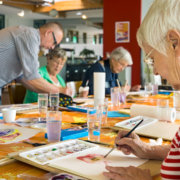Giving Back to Caregivers in Facilities for Alzheimer’s
Aged Care Employee Day is observed on August 7 each year to recognize those who care for the elderly in professional settings. It highlights the everyday dedication of staff members who support older adults with compassion, whether through medical care, meals, cleaning, or simply offering company. While the day honors all aged care workers, its meaning deepens in facilities for Alzheimer’s, where the care required goes beyond routine tasks and often involves emotional strength and quiet patience.
Understanding the Caregiver’s Role in Alzheimer’s Facilities
Understanding what caregivers do in Alzheimer’s care settings is essential in truly appreciating their efforts and dedication. When people recognize the depth of their work, any act of giving back becomes more thoughtful and sincere; that is, it’s rooted not just in gratitude, but in genuine understanding.
Caregivers in these settings assume a wide range of responsibilities that extend far beyond basic assistance. Here are some of the many roles they fulfill daily:
- Assisting with personal care such as bathing, dressing, and eating
- Managing medications and monitoring physical and emotional changes
- Providing emotional reassurance during moments of confusion or distress
- Keeping the environment safe by preventing falls and reducing triggers
- Supporting daily routines that help reduce anxiety and disorientation
- Communicating with families about changes in behavior or condition
- Coordinating with doctors and specialists for ongoing care
- Offering companionship that brings calm and connection
Of course, the demands of this work are significant, especially in facilities for Alzheimer’s, where residents often require constant supervision and emotional presence.
Some of the biggest challenges caregivers face include the following:
- High levels of physical and mental fatigue
- Emotional toll from resident decline
- Managing challenging behaviors or aggression
- Limited staffing and time pressure
- Balancing care for many individuals at once
- Navigating complex care decisions with families
- Working long hours, often without breaks
Understanding these realities helps build a deeper appreciation for their role and why their work deserves both recognition and support.
Ways to Show Appreciation in Facilities for Alzheimer’s
There’s something quietly powerful about giving back, as it not only uplifts the person receiving kindness, but it also has a way of grounding the giver. Acts of appreciation, no matter how simple, can leave both sides feeling more connected and valued.
For those who give, showing gratitude fosters a more profound sense of purpose. It allows families and co-workers to pause, reflect, and feel a part of the care journey. It also reminds us that kindness doesn’t need to be grand to make an impact.
For caregivers, especially those in facilities for Alzheimer’s, small gestures can mean everything. Their days are filled with emotionally demanding tasks, often without much recognition. A simple thank-you or thoughtful gesture tells them that their hard work is recognized, and that their care matters not just to residents, but to the people who love those residents as well.
Here are a few meaningful ways to show appreciation to caregivers in these settings:
- Say thank you, sincerely and often
- Offer to bring them a meal or snack
- Write a short, heartfelt note
- Gift them a small gift card or care package
- Check in and ask how they’re doing
- Offer to cover a task or shift if appropriate
- Include them in celebrations or special occasions
- Recommend them to supervisors or publicly recognize their efforts
Recognizing caregivers also means supporting the culture of compassion they help uphold, which ultimately shapes the quality of life for every person in their care.
Learn about life at Richmont Senior Living by clicking here!
Richmont Senior Living is proud to serve Ashland, NE and the surrounding cities: Memphis, Springfield, South Bend, Greenwood, Murdock, Waverly, Murdock, Ithaca, and Chalco






